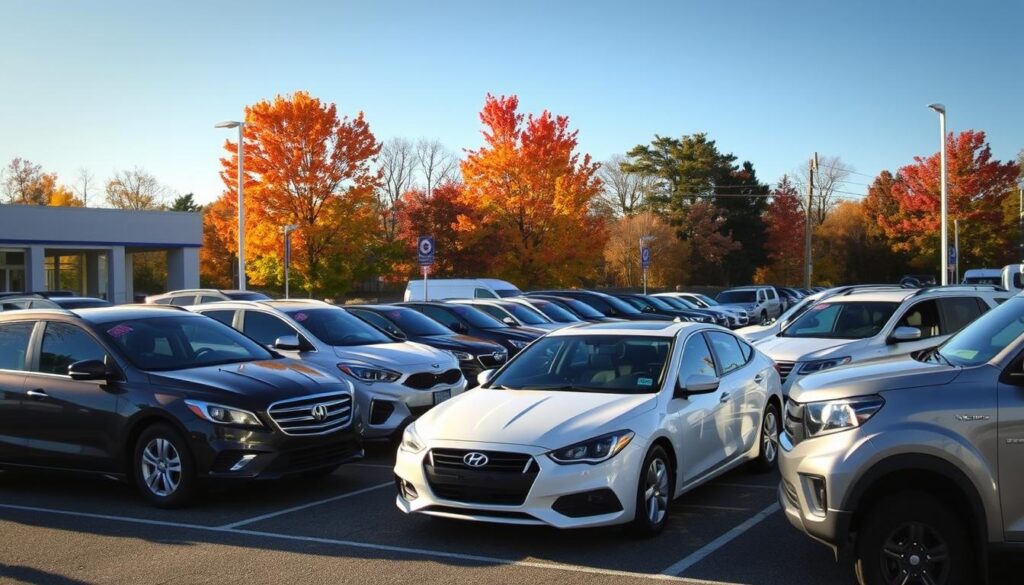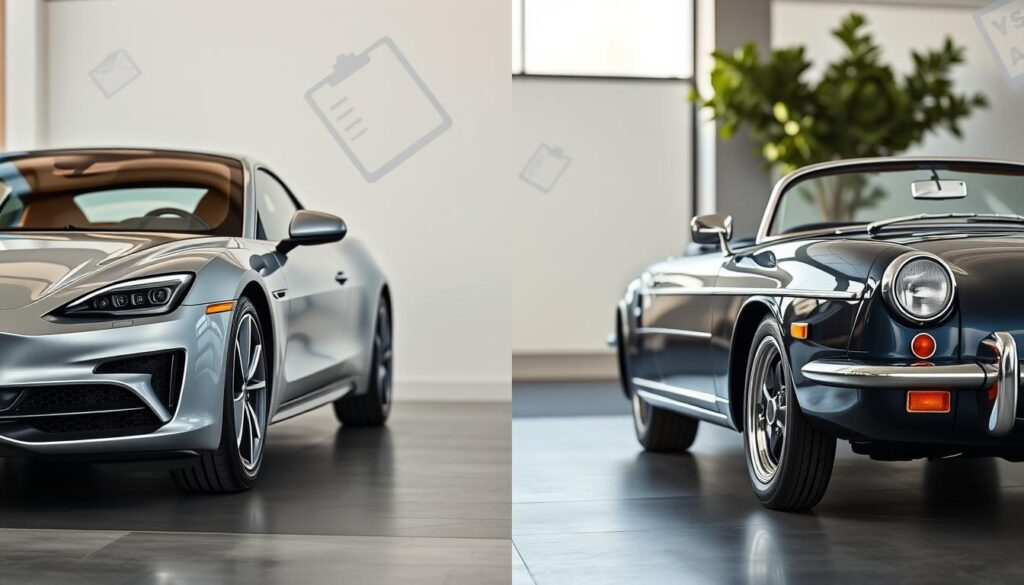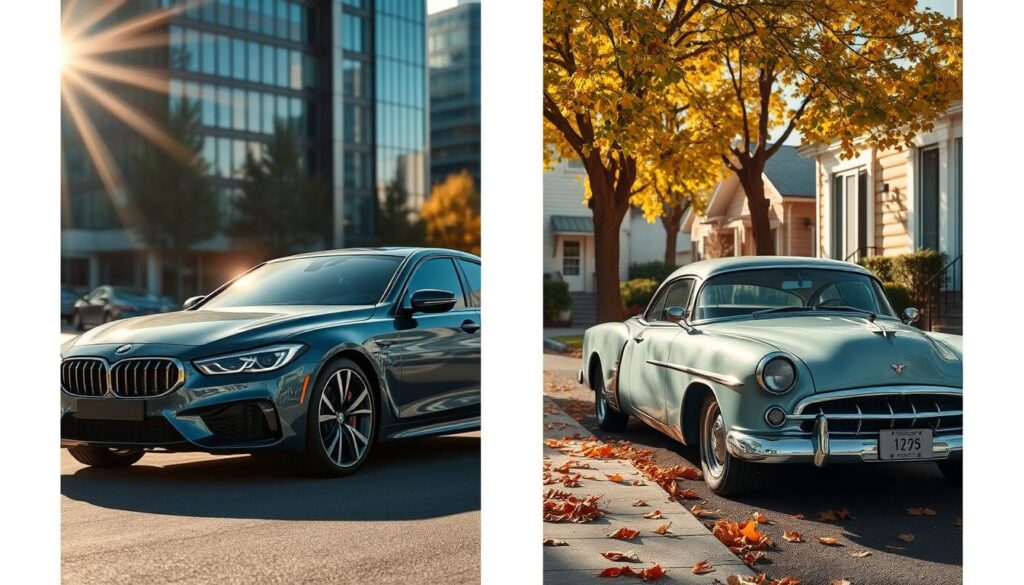Standing in front of a car dealership can be daunting. You’re deciding between a shiny new car and a used one. This choice affects your wallet, driving fun, and the planet. But don’t worry, this is your chance to find the perfect car for you.
Whether you’re buying your first car or looking for a new ride, it’s a big deal. It’s a time to think about what you really want. You’ll learn what matters most to you and make a choice that changes your daily life.
In This Guide
Understanding New vs Used Car: The Basic Differences
Choosing between a new or used car is a big decision. It affects your driving experience and costs over time. Knowing the differences is key.
Price Points and Initial Investment
New cars usually cost more upfront. They have the latest tech and designs, along with warranties. Used cars are cheaper, making them a good choice for those watching their budget.
Feature Availability and Technology
New cars have the latest safety features and tech. You’ll find adaptive cruise control, lane-keeping assistance, and touchscreen infotainment systems. Used cars might have some of these, but the tech level depends on the car’s age and history.
Warranty Coverage Options
- New cars come with full manufacturer warranties. These cover many parts for years and miles, giving you peace of mind.
- Used cars might have no warranty or a limited one. This means you’ll need to think about vehicle depreciation and repair costs.
Knowing the differences between new and used cars helps you choose wisely. It’s about finding the right fit for your budget, needs, and future plans.
The Financial Impact of Vehicle Depreciation
When you think about buying a car, depreciation is key. It affects the cost of owning a car, whether it’s new or used. This is something to really think about.
New cars lose a lot of value quickly, often in the first few years. On the other hand, used cars tend to lose value more slowly. This makes used cars a better deal over time.
| Depreciation Rate | New Car | Used Car |
|---|---|---|
| 1st Year | 20-30% | 10-15% |
| 2nd Year | 10-15% | 5-10% |
| 3rd Year | 5-10% | 3-5% |
Knowing about depreciation is important when you’re looking at car financing and costs. It helps you make a smart choice and get the most value for your money.
“Depreciation is often the largest expense in owning a vehicle, accounting for nearly 50% of the total cost of ownership over five years.”
- Think about depreciation when choosing between new and used cars.
- Consider the long-term costs of your car purchase.
- Look at the car’s resale value to understand its financial impact.
Benefits of Buying a New Vehicle
Choosing between a new or used car is a big decision. But, buying a new vehicle has many advantages. You get the latest safety features and technology. Plus, there’s comprehensive warranty coverage and options to customize your car.
Latest Safety Features and Technology
New cars come with the latest safety and tech features. This gives you peace of mind while driving. Features like automatic emergency braking and lane departure warning systems help prevent accidents.
Manufacturer Warranty Protection
Buying a new car means you get a full manufacturer’s warranty. This warranty coverage protects you from unexpected costs. It ensures any issues are fixed quickly and for free.
Customization Options
With a new car, you can make it your own. Choose the color, interior, and features you want. This lets you create a car that matches your style and needs.
Thinking about these benefits helps you make a choice that fits your needs and budget. It’s about finding the right car for you.
Advantages of Choosing a Pre-owned Vehicle
Looking into pre-owned vehicles can change your car buying game. They offer lower costs and less depreciation. This makes them a great choice for many.
One big plus of a pre-owned vehicle is the lower price. They cost much less than new cars. This is great for those watching their budget or wanting more bang for their buck.
Another benefit is less depreciation. New cars lose a lot of value quickly. But, a pre-owned car has already seen this drop. This means its value stays more stable over time. It’s good for keeping or selling later.
- Lower initial costs
- Reduced depreciation rates
- Potential to acquire a higher-end model at a more affordable price
Thinking about the perks of a pre-owned vehicle helps you make a smart choice. You can get a reliable, well-equipped car without the high price of new. It’s all about finding the right fit for your budget and needs.

Certified Pre-owned Programs: A Middle Ground
In the car buying world, there’s a special option that falls between new and used cars. Certified pre-owned (CPO) programs offer a middle ground. They give you the perks of a used car with the confidence of a manufacturer’s approval.
Manufacturer Certification Process
CPO vehicles undergo a detailed inspection and reconditioning by the manufacturer or its dealers. They check the car’s history and make sure it meets high quality standards. Only cars that pass this test get the certified pre-owned label.
Extended Warranty Benefits
One big plus of a certified pre-owned car is the extended warranty. CPO cars often have a warranty from the manufacturer. This extra protection lasts longer than usual used car warranties. It gives buyers peace of mind for their investment.
Quality Assurance Standards
Certified pre-owned programs have strict quality standards. They have age and mileage limits and a detailed inspection. This process ensures the car is in top shape. It makes buying a CPO car a safer choice.
Understanding certified pre-owned programs helps you decide between a certified pre-owned car and a new one. The warranty coverage and quality checks make CPO a great middle ground. It’s worth considering in the new vs. used car debate.
Long-term Ownership Costs and Considerations
Choosing between a new or used car involves more than just the initial cost. Long-term costs can greatly affect your budget and financial health. Let’s look at the main factors that influence long-term costs and maintenance history.
The maintenance history of a vehicle is a key factor. Used cars often have a longer repair and service record. This can give you insight into the car’s reliability and future maintenance needs. Reviewing the maintenance history helps you plan for any upcoming repairs or maintenance.
- Fuel efficiency: New cars usually have better fuel economy, saving you money on gas. But, fuel efficiency can change based on how you drive and the conditions.
- Insurance costs: New cars cost more to insure because they’re worth more. Used cars often have lower insurance rates.
- Depreciation: New cars lose a lot of value right after you buy them. Used cars have already taken the biggest hit, which can mean better long-term value.
To make a smart choice, it’s important to compare the long-term costs and maintenance needs of new and used cars. This helps you find the best fit for your budget and driving needs.
“The true cost of owning a vehicle goes far beyond the sticker price. Carefully weighing the long-term expenses can make all the difference in finding the right car for your financial situation.”
Financing Options and Interest Rates
When looking at automotive financing, knowing your options and interest rates is key. It affects your car buying decision. Whether it’s a new or used car, understanding the financial side is essential.
New Car Loan Programs
For new cars, dealerships and lenders offer various financing plans. These include:
- Manufacturer-sponsored loans with competitive interest rates
- Extended repayment terms, often up to 72 or 84 months
- Lease options that allow you to drive a new car for a lower monthly cost
Used Car Financing Terms
Used cars have different financing terms than new ones. Consider these factors:
- Shorter loan durations, typically 36 to 60 months
- Higher interest rates, which can vary based on the vehicle’s age and mileage
- Potential for down payments or trade-in values to play a more significant role in the approval process
Credit Score Impact
Your credit score greatly affects your automotive financing options and rates. Those with better scores get better rates and terms. But, lower scores might lead to higher rates or financing issues.
Knowing about automotive financing helps you make a smarter car buying decision. It ensures you get the best deal for your money.
Insurance Costs and Coverage Differences
Choosing between a new or used car involves thinking about insurance costs and coverage. Car insurance can be complex, but knowing the differences helps. This knowledge aids in making a choice that fits your budget and needs over time.
Insurance for new cars usually costs more than for used ones. New cars have higher values, which means higher costs for comprehensive and collision coverage. They also come with advanced safety features and tech, which can raise repair costs after an accident.
Used cars, however, have lower insurance costs because their value drops over time. This can lead to big savings on your long-term costs, especially for new vs used car owners. Yet, it’s key to think about the long-term costs of the car. Older cars might need more repairs and maintenance, which could cancel out the initial insurance savings.
| Insurance Factor | New Car | Used Car |
|---|---|---|
| Market Value | Higher | Lower |
| Safety Features | Advanced | Varied |
| Repair Costs | Higher | Lower |
| Insurance Premiums | Higher | Lower |
It’s important to compare insurance quotes for new and used cars. This ensures you choose the best option for your budget and coverage needs. By looking at insurance costs and coverage, you can balance your initial investment with long-term new vs used car expenses.

Maintenance Requirements and Reliability
Choosing between a new or used car means thinking about maintenance and reliability. New cars usually have a service schedule from the maker. This helps you keep up with important maintenance tasks. Used cars, however, might have a less clear maintenance history. This can affect both costs and reliability over time.
Service Schedules
New cars have set service schedules for things like oil changes and tire rotations. Following these can keep your car running well and avoid big problems later. With a used car, you might need to look up the previous owner’s maintenance or use the car’s service records to figure out when to service it.
Parts Availability
Newer cars usually have easier access to parts because manufacturers keep making and stocking them. This makes repairs quicker and cheaper. Used cars, though, might need harder-to-find parts. This can make repairs take longer and cost more.
Repair Frequency
New cars often need fewer repairs in the first few years than used cars do. This is because new cars use the latest technology and come with a warranty. But, the repair needs of a used car can vary a lot. It depends on the car’s history, how many miles it has, and how well it was maintained before.

